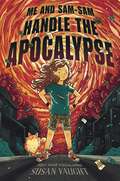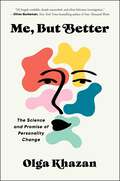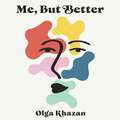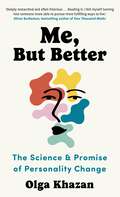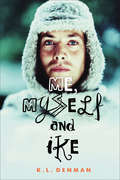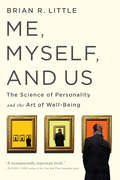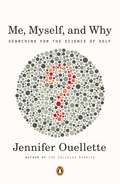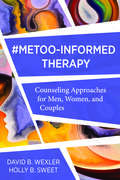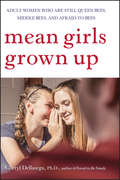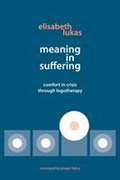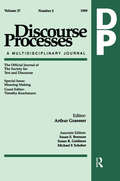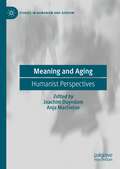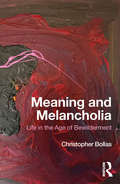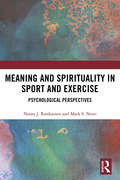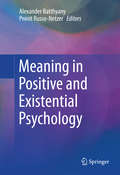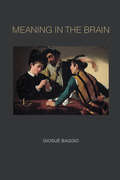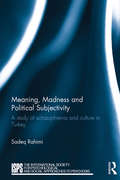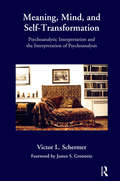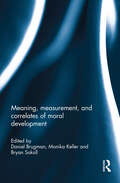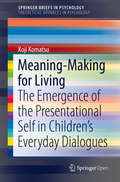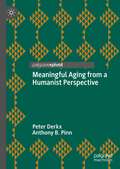- Table View
- List View
Me and Sam-Sam Handle the Apocalypse
by Susan Vaught<P><P> Jesse is on the case when money goes missing from the library and her dad is looking like the #1 suspect in Edgar Award–winning author Susan Vaught’s latest middle grade mystery. <P><P>I could see the big inside of my Sam-Sam. I had been training him for 252 days with mini tennis balls and pieces of bacon, just to prove to Dad and Mom and Aunt Gus and the whole world that a tiny, fluffy dog could do big things if he wanted to. I think my little dog always knew he could be a hero. I just wonder if he knew about me. <P><P>When the cops show up at Jesse’s house and arrest her dad, she figures out in a hurry that he’s the #1 suspect in the missing library fund money case. With the help of her (first and only) friend Springer, she rounds up suspects (leading to a nasty confrontation with three notorious school bullies) and asks a lot of questions. But she can’t shake the feeling that she isn’t exactly cut out for being a crime-solving hero. <P><P>Jesse has a neuro-processing disorder, which means that she’s “on the spectrum or whatever.” As she explains it, “I get stuck on lots of stuff, like words and phrases and numbers and smells and pictures and song lines and what time stuff is supposed to happen.” <P><P>But when a tornado strikes her small town, Jesse is given the opportunity to show what she's really made of—and help her dad. <P><P>Told with the true-as-life voice Susan Vaught is known for, this mystery will have you rooting for Jesse and her trusty Pomeranian, Sam-Sam.
Me, But Better: The Science and Promise of Personality Change
by Olga KhazanIs it really possible to change your entire personality in a year? An award-winning journalist experiments with her own personality to find out—and reveals the science behind lasting change.In recent years, Olga Khazan had been spiraling toward an existential crisis. Though she treasured her loving relationship and her dream job, her neurotic personality often left her snatching dissatisfaction from the jaws of happiness. While her overachieving had always been a professional asset, Olga lately felt like her brittle disposition could shatter under the weight of just one more thing—but could she really change her entire personality? Research shows that you can alter your personality traits by behaving in ways that align with the kind of person you&’d like to be—a process that can make you happier, healthier, and more successful. In Me, But Better, Olga embarks on an experiment to see whether it&’s possible to go from dwelling in dread to &“radiating joy.&” For one year, Olga reluctantly clicked &“yes&” on a bucket list of new experiences—from meditation to improv to sailing—that forced her to at least act happy. With a skeptic&’s eye, Olga brings you on her journey through the science of personality, presenting evidence-backed techniques to help you change your mind for the better. Sharply witty and deeply fascinating, Me, But Better offers a probing inquiry into what it means to live a fulfilling life, and how you can keep diving into change, no matter how uncomfortable it feels.
Me, But Better: The Science and Promise of Personality Change
by Olga KhazanIn recent years, Olga Khazan had been spiraling toward an existential crisis. Though she treasured her loving, long-term relationship and her dream job, she often caught herself snatching dissatisfaction from the jaws of happiness. Her neurotic overachieving had always been a professional asset, but lately, Olga felt that her brittle disposition could shatter under the weight of just one more thing. She knew something had to give-but was it really possible to change her entire approach to life?In Me, But Better, Olga embarks on a year-long experiment to see if it's truly possible to change your personality, sample size: one. Scientifically, personality consists of five sliding-scale traits: extroversion (how sociable you are); conscientiousness (how self-disciplined and organized you are); agreeableness (how warm and empathetic you are); openness (how receptive you are to new ideas and activities); and neuroticism (how depressed or anxious you are). But research shows that you can alter these traits by consistently behaving in ways that align with the kind of person you'd like to be. And that, in turn, can make you happier, healthier, and more successful.So, for one year, Olga decided to fake it until she made it. She reluctantly clicked "yes" on a bucket list of new experiences, from meditation to improv to sailing, that forced her to at least act happy, healthy, and well-adjusted, in the hope that she would actually become those things. With a skeptic's eye, Olga brings you on her personal journey through the science of personality, presenting evidence-backed techniques to change your mind for the better. Based on her viral article in The Atlantic, Me, But Better is a probing inquiry into what it means to live a fulfilling life, and how you can keep diving into change, no matter how uncomfortable it feels.
Me, But Better: The Science and Promise of Personality Change
by Olga KhazanIn recent years, Olga Khazan had been spiraling toward an existential crisis. Though she treasured her loving, long-term relationship and her dream job, she often caught herself snatching dissatisfaction from the jaws of happiness. Her neurotic overachieving had always been a professional asset, but lately, Olga felt that her brittle disposition could shatter under the weight of just one more thing. She knew something had to give-but was it really possible to change her entire approach to life?In Me, But Better, Olga embarks on a year-long experiment to see if it's truly possible to change your personality, sample size: one. Scientifically, personality consists of five sliding-scale traits: extroversion (how sociable you are); conscientiousness (how self-disciplined and organized you are); agreeableness (how warm and empathetic you are); openness (how receptive you are to new ideas and activities); and neuroticism (how depressed or anxious you are). But research shows that you can alter these traits by consistently behaving in ways that align with the kind of person you'd like to be. And that, in turn, can make you happier, healthier, and more successful.So, for one year, Olga decided to fake it until she made it. She reluctantly clicked "yes" on a bucket list of new experiences, from meditation to improv to sailing, that forced her to at least act happy, healthy, and well-adjusted, in the hope that she would actually become those things. With a skeptic's eye, Olga brings you on her personal journey through the science of personality, presenting evidence-backed techniques to change your mind for the better. Based on her viral article in The Atlantic, Me, But Better is a probing inquiry into what it means to live a fulfilling life, and how you can keep diving into change, no matter how uncomfortable it feels.
Me, Myself and Ike
by K. L. DenmanAfter watching a tv program about Otzi, a 5,000-year-old Ice Man, Kit's friend Ike becomes convinced that Kit's destiny is to become the next ice man -- a source of information for future generations. Together they obtain artifacts they think will accurately reflect life in the early twenty-first century and plan their journey to a nearby mountain. Kit gets tattoos similar to Otzi's, writes a manifesto and tries to come to terms with making the ultimate sacrifice. As he grows more and more agitated and isolated, his family and friends suspect that something is terribly wrong, but before they can discover the true severity of the situation, Kit and Ike set off on what could be their last journey.
Me, Myself, and Us: The Science of Personality and the Art of Well-Being
by Brian R. LittleIn the past few decades, personality psychology has made considerable progress in raising new questions about human nature--and providing some provocative answers. New scientific research has transformed old ideas about personality based on the theories of Freud, Jung, and the humanistic psychologies of the nineteen sixties, which gave rise to the simplistic categorizations of the Meyer-Briggs Inventory and the 'enneagream'. But the general public still knows little about the new science and what it reveals about who we are. In this book, Brian Little, one of the psychologists who helped re-shape the field, provides the first in-depth exploration of the new personality science and its provocative findings for general readers. The book explores questions that are rooted in the origins of human consciousness but are as commonplace as yesterday’s breakfast conversation. Are our first impressions of other people’s personalities usually fallacious? Are creative individuals essentially maladjusted? Are our personality traits, as William James put it "set like plaster” by the age of thirty? Is a belief that we are in control of our lives an unmitigated good? Do our singular personalities comprise one unified self or a confederacy of selves, and if the latter, which of our mini-me-s do we offer up in marriage or mergers? Are some individuals genetically hard-wired for happiness? Which is the more viable path toward human flourishing, the pursuit of happiness or the happiness of pursuit? Little provides a resource for answering such questions, and a framework through which readers can explore the personal implications of the new science of personality. Questionnaires and interactive assessments throughout the book facilitate self-exploration, and clarify some of the stranger aspects of our own conduct and that of others. Brian Little helps us see ourselves, and other selves, as somewhat less perplexing and definitely more intriguing. This is not a self-help book, but students at Harvard who took the lecture course on which it is based claim that it changed their lives.
Me, Myself, and Why
by Jennifer OuelletteA fascinating tour through the science behind who we are and how we got this way--from the author of The Calculus Diaries As diverse as people appear to be, all of our genes and brains are nearly identical. In Me, Myself, and Why, Jennifer Ouellette dives into the miniscule ranges of variation to understand just what sets us apart. She draws on cutting-edge research in genetics, neuroscience, and psychology--enlivened as always with her signature sense of humor--to explore the mysteries of human identity and behavior. Readers follow her own surprising journey of self-discovery as she has her genome sequenced, her brain mapped, her personality typed, and even samples a popular hallucinogen. Bringing together everything from Mendel's famous pea plant experiments and mutations in The X-Men to our taste for cilantro and our relationships with virtual avatars, Ouellette takes us on an endlessly thrilling and illuminating trip into the science of ourselves.
MeToo-Informed Therapy: Counseling Approaches for Men, Women, and Couples
by David B. Wexler Holly B. SweetHelp for both victims and offenders of sexual misconduct in the age of #MeToo. The rapid rise of the #MeToo movement has created a seismic shift in how we work with sexual misconduct that occurs in relationships between men and women, but the scope and impact of behaviors within that category is full of gray areas. #MeToo-Informed Therapy guides therapists in finding effective ways to help men who offend, empowering women to find their voices, exploring ways for men to be allies in the #MeToo movement, and helping couples whose relationships can be enhanced by understanding #MeToo issues. Traditional male and female gender role norms are discussed in the context of how they might contribute to incidents of sexual misconduct. Importantly, the book also takes a look at how intersectional factors around race, sexual orientation, and socioeconomic status adds further complexity to these questions. Here, therapists will find the information and perspective they need to support their clients.
Mealtimes and Milestones: A Teenager's Diary Of Moving On From Anorexia
by Constance BarterAn astonishingly moving and mature account of a young woman's struggle with anorexia nervosa, a serious mental illness affecting 1.1 million people in the UK. At fourteen years of age, Constance Barter was admitted as an in-patient to a specialist eating disorders unit where she remained for seven months. During that time, she kept a diary which sheds light on what it means to have anorexia, how it affects your life, and how it is not just a faddy diet or attention seeking disorder. Constance is an example to anyone suffering from this potentially life-threatening illness that with perseverance and support it can be beaten and sufferers can go on and lead a fulfilling, everyday life. This inspirational diary will help and inspire other sufferers to seek help and overcome their illness as well as providing an invaluable insight into the nature of the illness to families and friends.
Mealtimes and Milestones: A teenager's diary of moving on from anorexia
by Constance BarterAn astonishingly moving and mature account of a young woman's struggle with anorexia nervosa, a serious mental illness affecting 1.1 million people in the UK. At fourteen years of age, Constance Barter was admitted as an in-patient to a specialist eating disorders unit where she remained for seven months. During that time, she kept a diary which sheds light on what it means to have anorexia, how it affects your life, and how it is not just a faddy diet or attention seeking disorder. Constance is an example to anyone suffering from this potentially life-threatening illness that with perseverance and support it can be beaten and sufferers can go on and lead a fulfilling, everyday life. This inspirational diary will help and inspire other sufferers to seek help and overcome their illness as well as providing an invaluable insight into the nature of the illness to families and friends.
Mean Girls Grown Up
by Cheryl DellasegaAlmost every woman has experienced bullying. Whether her role was that of victim, aggressor, or bystander, the pain of relational aggression (female bullying) lasts long after the incident has passed. In Mean Girls Grown Up, Cheryl Dellasega explores why women are often their own worst enemies, offering practical advice for a variety of situations. Drawing upon extensive research and interviews, she shares real-life stories from women as well as the knowledge of experts who have helped women overcome the negative effects of aggression. Readers will hear how adult women can be just as vicious as their younger counterparts, learn strategies for dealing with adult bullies, how to avoid being involved in relational aggression, and more. Dellasega outlines how women can change their behavior successfully by shifting away from aggression and embracing a spirit of cooperation in interactions with others.
Meaning In Suffering: Comfort In Crisis Through Logotherapy
by Elisabeth LukasThis 1986 classic has been renewed with fresh graphics and crisp typesetting. The author’s artistic discovery of the uniqueness of each individual shines across dozens of case studies and examples; thus she illuminates the potential for meaning in the presence of even intractable pain, guilt, and suffering. Lukas demonstrates a living logotherapy, not by standardized techniques, but by the compassion and insight she brings into each therapeutic relationship. "The true heroes of life are not the triumphant victors, but the defeated who find a ray of hope" (p. 52).
Meaning Making: A Special Issue of Discourse Processes
by Timothy KoschmannThis special issue focuses on the difficult problem of how observers and researchers can make sense of how collaborating participants develop a shared understanding both of their task and their own participation in it. Or stated in another way, how can we derive meaning from their emergent and situated meaning making? Meaning making has been studied under a variety of names, and can be conceptualized on different levels of abstraction and from a variety of perspectives. The goal is to attempt to tease apart some of these views, while at the same time seeking means to bring them together in order to provide a more fully elaborated picture. This issue comes with a CD-ROM containing the brief video segment which all authors analyzed in the preparation of their contributions.
Meaning and Aging: Humanist Perspectives (Studies in Humanism and Atheism)
by Anja Machielse Joachim DuyndamThe main objective of this book is to add, from a humanist perspective, new interdisciplinary insights and research results to the current academic debate on aging. The collection aims to enhance and complement the predominantly biomedical and sociological debates and provide a more comprehensive and highly topical view on aging and old age. By purveying a meaning-in-life perspective to the current debate we want to enrich and to deepen the research on aging, thus aspiring to an ideal of meaningful aging. The starting point of this book is a humanistic meaning frame for addressing basic needs of a meaningful existence, such as having goals in life, a sense of self-worth, connectedness with others, moral justification, a certain degree of understanding (comprehensibility), direction and influence with a view to cohesion in life, and not in the least place: (living) pleasure or excitement. Taken together, the essays show that experiencing a meaningful life contributes to one’s mentalresilience, conceived as the ability to realize a humane individuality (autonomy) in thinking and acting in situations of adversity and vulnerability, particularly those faced by older people.
Meaning and Melancholia: Life in the Age of Bewilderment
by Christopher BollasMeaning and Melancholia: Life in the Age of Bewilderment sees Christopher Bollas apply his creative and innovative psychoanalytic thinking to various contemporary social, cultural and political themes. This book offers an incisive exploration of powerful trends within, and between, nations in the West over the past two hundred years. The author traces shifts in psychological forces and ‘frames of mind’, that have resulted in a crucial ‘intellectual climate change’. He contends that recent decades have seen rapid and significant transformations in how we define our ‘selves’, as a new emphasis on instant connectedness has come to replace reflectiveness and introspection. Bollas argues that this trend has culminated in the current rise of psychophobia; a fear of the mind and a rejection of depth psychologies that has paved the way for what he sees as hate based solutions to world problems, such as the victory of Trump in America and Brexit in the United Kingdom. He maintains that, if we are to counter the threat to democracy posed by these changes and refind a more balanced concept of the self within society, we must put psychological insight at the heart of a new kind of analysis of culture and society. This remarkable, thought-provoking book will appeal to anyone interested in politics, social policy and cultural studies, and in the gaining of insight into the ongoing challenges faced by the Western democracies and the global community.
Meaning and Spirituality in Sport and Exercise: Psychological Perspectives (Routledge Research in Sport, Culture and Society)
by Noora J Ronkainen Mark S NestiDespite the growing literature on spirituality and its positive impact on well-being in health psychology, education, occupational psychology and leisure studies, it has been less examined in sport studies. Meaning and Spirituality in Sport and Exercise: Psychological Perspectives examines the many forms of spirituality in sport from a psychological perspective, from moments of transcendence and finding deeper meaning and value to prayer before an important competition or in adversity, such as a career-threatening injury. Based on the latest research and the Nesti’s experience in applied sport psychology service delivery, this book covers a range of novel topics linking spirituality to athlete development, injury, exercise motivation, and ageing athletes, and offers applied, practical guidance for sport psychologists working with spiritual athletes. Offering a unique contribution to the study of spirituality in sport, and to sport psychology practice, this book is vital reading for any upper-level student or academic working in sport and exercise psychology, religion and sport, or the philosophy of sport, and any practising sport psychologist.
Meaning in Positive and Existential Psychology
by Alexander Batthyany Pninit Russo-NetzerThis book is a first attempt to combine insights from the two perspectives with regard to the question of meaning by examining a collection of theoretical and empirical works This volume therefore is destined to become an important addition to psychological literature: both from the viewpoint of the history of ideas (again this would be one of the first times that positive and existentialist psychologies meet) and from the viewpoint of theoretical and empirical research into the meaning concept in psychology.
Meaning in the Brain (The\mit Press Ser.)
by Giosue BaggioAn argument that the meaning of written or auditory linguistic signals is not derived from the input but results from the brain's internal construction process.When we read a text or listen to speech, meaning seems to be given to us instantaneously, as if it were part of the input. In Meaning in the Brain, Giosuè Baggio explains that this is an illusion created by the tremendous speed at which sensory systems and systems for meaning and grammar operate in the brain. Meaning, Baggio argues, is not derived from input but results from the brain's internal construction process. With this book, Baggio offers the first integrated, multilevel theory of semantics in the brain, describing how meaning is generated during language comprehension, production, and acquisition. Baggio's theory draws on recent advances in formal semantics and pragmatics, including vector-space semantics, discourse representation theory, and signaling game theory. It is designed to explain a growing body of experimental results on semantic processing that have accumulated in the absence of a unifying theory since the introduction of electrophysiology and neuroimaging methods.Baggio argues that there is evidence for the existence of three semantic systems in the brain—relational semantics, interpretive semantics, and evolutionary semantics—and he discusses each in turn, developing neural theories of meaning for all three. Moreover, in the course of his argument, Baggio addresses several long-standing issues in the neuroscience of language, including the role of compositionality as a principle of meaning construction in the brain, the role of sensory-motor processes in language comprehension, and the neural and evolutionary links among meaning, consciousness, sociality, and action.
Meaning, Discourse and Society
by Wolfgang TeubertMeaning, Discourse and Society investigates the construction of reality within discourse. When people talk about things such as language, the mind, globalisation or weeds, they are less discussing the outside world than objects they have created collaboratively by talking about them. Wolfgang Teubert shows that meaning cannot be found in mental concepts or neural activity, as implied by the cognitive sciences. He argues instead that meaning is negotiated and knowledge is created by symbolic interaction, thus taking language as a social, rather than a mental, phenomenon. Discourses, Teubert contends, can be viewed as collective minds, enabling the members of discourse communities to make sense of themselves and of the world around them. By taking an active stance in constructing the reality they share, people thus can take part in moulding the world in accordance with their perceived needs.
Meaning, Madness and Political Subjectivity: A study of schizophrenia and culture in Turkey (The International Society for Psychological and Social Approaches to Psychosis Book Series)
by Sadeq RahimiThis book explores the relationship between subjective experience and the cultural, political and historical paradigms in which the individual is embedded. Providing a deep analysis of three compelling case studies of schizophrenia in Turkey, the book considers the ways in which private experience is shaped by collective structures, offering insights into issues surrounding religion, national and ethnic identity and tensions, modernity and tradition, madness, gender and individuality. Chapters draw from cultural psychiatry, medical anthropology, and political theory to produce a model for understanding the inseparability of private experience and collective processes. The book offers those studying political theory a way for conceptualizing the subjective within the political; it offers mental health clinicians and researchers a model for including political and historical realities in their psychological assessments and treatments; and it provides anthropologists with a model for theorizing culture in which psychological experience and political facts become understandable and explainable in terms of, rather than despite each other. Meaning, Madness, and Political Subjectivity provides an original interpretative methodology for analysing culture and psychosis, offering compelling evidence that not only "normal" human experiences, but also extremely "abnormal" experiences such as psychosis are anchored in and shaped by local cultural and political realities.
Meaning, Mind, and Self-Transformation: Psychoanalytic Interpretation and the Interpretation of Psychoanalysis
by Victor L. SchermerInterpretation is the primary intervention of psychoanalysis. Until now it has been discussed almost exclusively from a technical standpoint, rather than its relationship to the mind, human life, and how it affects the personality. This book explores the intrinsic nature of interpretation in psychoanalysis. For that purpose, two streams of thought are brought into dialogue with one another: Anglo-American psychoanalysis and Continental European philosophical hermeneutics, the study of meaning and interpretation. This book celebrates and makes explicit the value of interchanges between the paradigm of science and philosophical hermeneutics. It is divided into three sections, preceded by a discussion of the relationship between psychoanalysis, hermeneutics, and the sciences, with psychoanalysis at a crossroads seeking a new path. Part 1 starts with a consideration of Freud's methodology in The Interpretation of Dreams, moving to a review of ancient, romantic, and modern theories of interpretation as they relate to psychoanalysis.
Meaning, measurement, and correlates of moral development
by Daniel Brugman, Monika Keller and Bryan SokolMorality has once again become an important focus of research in different scientific disciplines, from biology, neuroscience and evolutionary psychology, to social psychology, economics, and political philosophy. One of the reasons for this renewed interest stems from the tragedies that human beings, individually or in groups, inflict upon the lives of one another and the world at large, tragedies such as war, the extinction of species and ecological destruction, climate change, and last but not least – the financial crisis. Moral destitution and collapse, a lack of respect for human dignity and worth, and deficits in proper moral functioning at all levels of the world community, often discounted or masked by transparent excuses and vacuous rationalizations, are all viewed as principal causes of the social, societal and ecological crises with which we are confronted today. The key to solving these crises must lie, at least partly, in a better understanding and active deployment of morality. Developmental psychology is charged with the specific task of illuminating the growth and evolution of moral functioning in human beings. This book was originally published as a special issue of the European Journal of Developmental Psychology.
Meaning-Full Disease: How Personal Experience and Meanings Cause and Maintain Physical Illness
by Brian BroomThe book is grounded upon the author's extensive professional involvement with physical diseases that are a powerful expression of the patients' emotional themes and life-stories. They are meaning-full diseases. They occur commonly, and are the most compelling argument for an urgent acknowledgment of the role of meanings in the healing process. Following the pattern of his first book, Somatic Illness and the Patient's Other Story, the author shows in case after case that listening and responding to the "story" of patients suffering from persistent physical diseases frequently leads to major reversal of the disease processes. This present book takes a crucial second step. There must be an understandable basis for meaning-full diseases. Resistance to them relates in part to the inability of current Western scientific and biomedical theories to explain them. The author sets out to construct conceptual frameworks, within which clinicians and patients can see that a close relationship between life experience and the appearance of physical disease really does make sense.
Meaning-Making for Living: The Emergence of the Presentational Self in Children’s Everyday Dialogues (SpringerBriefs in Psychology)
by Koji KomatsuThis Open Access Brief analyzes the dynamics in which children’s selves emerge through their everyday activities of meaning construction, both in their relationships with family and within school education. It begins with a discussion of new psychological inquiries into children's selves and builds upon the innovative theoretical notion of the Presentational Self, developed by the author over the last decade. The book illustrates how the observation of children’s meaning construction in their everyday lives becomes a starting point for theoretical and empirical inquiries into child development and gives a framework that promotes new inquiries in this area. The book describes the Presentational Self Theory as a sense of how the notion of the Self is being worked upon in everyday life encounters. Chapters feature in-depth analyses of exchanges between adults and children in the Japanese cultural context. Meaning-Making for Living will be of interest to researchers and graduate students in the fields of cognitive, social, developmental, educational, and cultural psychology.
Meaningful Aging from a Humanist Perspective
by Anthony B. Pinn Peter DerkxAging is a topic of growing interest. As life expectancy in western societies is increasing, the growing number and proportion of ‘elderly’ persons raise urgent questions on how to age ‘well’. Predominantly, questions on aging are taken from biomedical and economic paradigms, which are intertwined. While people of age are seen as a cost in society, biomedical research aims at curing the declining effects of aging, thus furthering ideals of ‘healthy’ aging, ‘active’ aging, or ‘successful’ aging. In this book, Peter Derkx offers a comprehensive account of meaningful aging with Anthony Pinn responding in a fruitful and constructive way, for the benefit and edification of all of us.
